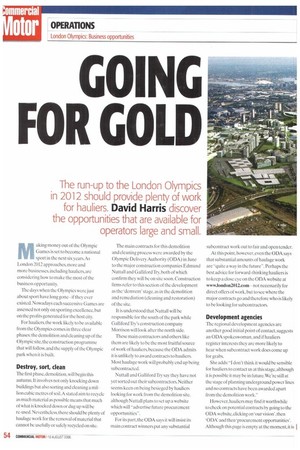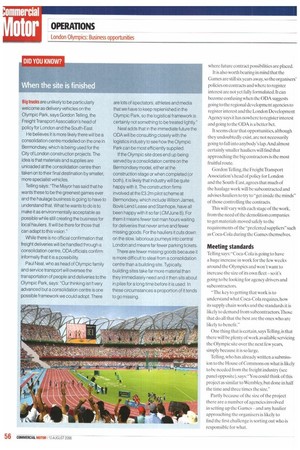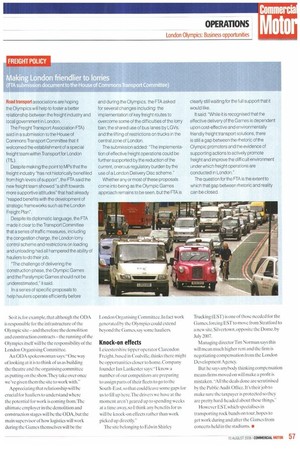GOING FOR GOLD
Page 54

Page 56

Page 57

If you've noticed an error in this article please click here to report it so we can fix it.
The run-up to the London Olympics in 2012 should provide plenty of work for hauliers. David Harris discover the opportunities that are available for operators large and small.
Making money out of the Olympic Games is set to become a national sport in the next six yearsAs London 2012 approaches, more and more businesses, including hauliers, are considering how to make the most of the business opportunity.
The days when the Olympics were just about sport have long goneif they ever existed. Nowadays each successive Games are assessed not only on sporting excellence, but on the profits generated for the host city.
For hauliers. the work likely lobe available from the Olympics comes in three clear phases: the demolition and cleaning up of the Olympic site.the construction programme that will follow, and the supply of the Olympic park when it is built.
Destroy, sort, clean
the first phase, demolition, will begin this autumn. It involves not only knocking down buildings but also sorting and cleaning a million cubic metres of soil.A stated aim to recycle as much material as possible means that much of what is knocked down or dug up will be re-used. Nevertheless, there should be plenty of haulage work for the removal of material that cannot be usefully or safely recycled on site. The main contracts for this demolition and cleaning process were awarded by the Olympic Delivery Authority (ODA) in June to the major construction companies Edmund Nuttall and Galliford Try, both of which confirm they will bean site soon. Construction firms refer to this section of the development as the 'demrem' stage, as in the demolition and remediation (cleaning and restoration) of the site.
It is understood that Nuttall will be responsible for the south of the park while Galliford Try's construction company Morrison will look after the north side.
These main contractors and others like them are likely lobe the most fruitful source of work of hauliers, because the ODA admits it is unlikely to award contracts to hauliers. Most haulage work will probably end up being subcontracted.
Nuttall and Galliford Try say they have not yet sorted out their subcontractors. Neither seems keen on being besieged by hauliers looking for work from the demolition site. although Nuttall plans to set up a website which will "advertise future procurement opportunities".
For its part, the ODA says it will insist its main contract winners put any substantial subcontract work out to fair and open tender.
At this point, however, even the ODA says that substantial amounts of haulage work are -quite a way in the future". Perhaps the best advice for forward-thinking hauliers is to keep a close eye on the ODA website at wwwJondon2012.com not necessarily for direct offers of work, but to see where the major contracts go and therefore who is likely to be looking for subcontractors
Development agencies
The regional development agencies arc another good initial point of contact, suggests an ODA spokeswoman, and if hauliers register interests they are more likely to hear when subcontract work does come up for grabs.
She adds: "I don't think it would be sensible for hauliers to contact us at this stage, although it is possible it may be in future. We're still at the stage of planning underground power lines and no contracts have been awarded apart from the demolition work."
However, hauliers may find it worthwhile to check on potential contracts by going lathe ODA we bsite, clicking on 'our vision',then 'ODA' and then 'procurement opportunities'. Although this page is empty at the moment, it is I where future contract possibilities are placed.
It is also worth bearing in mind that the Games are still six years away, so the organisers' policies on contracts and where to register interest are not yet fully formulated.It can become confusing when the ODA suggests going to the regional development agencies to register interest and the London Development Agency says it has nowhere to rester interest and going to the ODA is a better bet.
It seems clear that opportunities, although they undoubtedly exist, are not necessarily going to fall into anybody's lap. And almost certainly smaller hauliers will find that approaching the big contractors is the most fruitful route.
Gordon Telling, the FreightTransport Association's head of policy for London and the South-East, agrees that much of the haulage work will be subcontracted and advises hauliers to try to"get inside the minds" of those controlling the contracts.
This will vary with each stage of the work, from the need of the demolition companies to get materials moved safely to the requirements of the "preferred suppliers" such as Coca-Cola during the Games themselves.
Meeting standards
Telling says:"Coca-Cola is going to have a huge increase in work for the few weeks around the Olympics and won't want to increase the size of its own fleet-so it's going to be looking for agency drivers and subcontractors.
"The key to getting that work is to understand what Coca-Cola requires, how its supply chain works and the standards it is likely to demand from subcontractors.Those that do all that the best are the ones who are likely to benefit."
One thing that is certain, says Telling, is that there will be plenty of work available servicing the Olympic site over the next few years, simply because it is so large.
Telling, who has already written a submission to the House of Commons on what is likely to be needed from the freight industry (see panel opposite),says:"You could think of this project as similar to Wembley, hut done in half the time and three times the size."
Partly because of the size of the project there are a number of agencies involved in setting up the Games and any haulier approaching the organisers is likely to find the first challenge is sorting out who is responsible for what.
So it is, for example,that although the ODA is responsible for the infrastructure of the Olympic site and therefore the demolition and construction contractsthe running of the Olympics itself will be the responsibility of the London Organising Committee.
An ODA spokeswoman says: One way of looking at it is to think of us as building the theatre and the organising committee as putting on the show.They take over once we've given them the site to work with."
Appreciating that relationship will be crucial for hauliers to understand where the potential for work is corning from.The ultimate employer in the demolition and construction stages will be the ODA, but the main supervisor of how logistics will work during the Games themselves will be the London Organising Committee. In fact work generated by the Olympics could extend beyond the Games, say some hauliers.
Knock-on effects Leicestershire tipper operator Clarendon Freight, based in Coalville, thinks there might be opportunities closer to home. Company founder Ian Lankester says:"I know a number or our competitors are preparing to assign parts of their fleets to go to the South-East. so that could leave some gaps for us to fill up here.The drivers we have at the moment aren't geared up to spending weeks at a time away, so I think any benefits for us will be knock-on effects rather than work picked up directly."
The site belonging to Edwin Shirley Trucking (EST) is one of those needed for the Games, forcing EST to move from Stratford to a new site.Silvertown, opposite the Dome, by July 2007.
Managing director Tim Norman says this will mean much higher rent and the firm is negotiating corn pensation from the London Development Agency.
But he says anybody thinking compensation means firms moved on will make a profit is mistaken. "All the deals done are scrutinised by the Public Audit Office. It's their job to make sure the taxpayer is protected so they are pretty hard-headed about these things."
However EST, which specialises in transporting rock bands on tour, hopes to get work during and after the Games from concerts held in the stadiums. •




























































































































































































